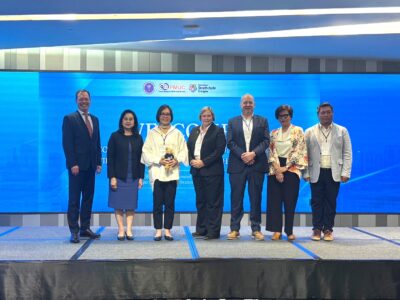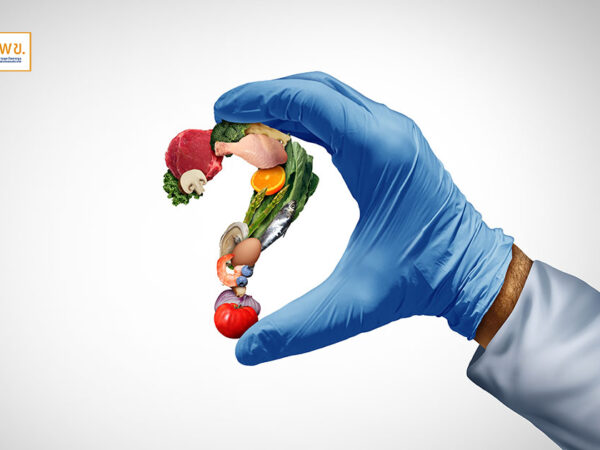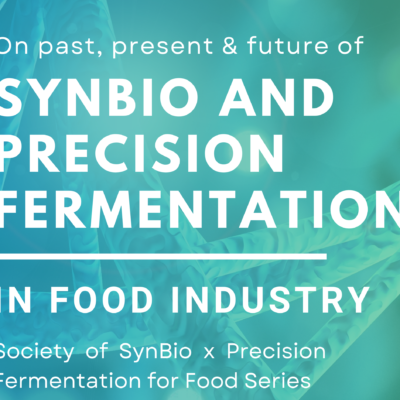“Thai cuisine is not just a soft power brimming with charm from its colors and flavors but is also fueled by innovative technologies that benefit both mood and health. Breaking away from traditional conventions of production process, it is enriched through the nurturing of business acumens, becoming so strong that it has been selected as one of the topics to be showcased on the world stage at London Tech Week 2024 with 10 startups that use technological innovations to create new kinds of food with deep technologies. It’s the kind of innovation that makes many people say, ‘How did they even come up with this?’
On their journey to London Tech Week 2024, these 10 startups will present the charm of Thainess under the theme ‘Thailand’s Taste of Tomorrow: Fostering the Future of Food, Faith, and Flavours’ at Riverside Studios, London, from June 10-14, 2024. The aim is to attract investors, importers, and target networks to elevate Thai food to a leading product in the global market.
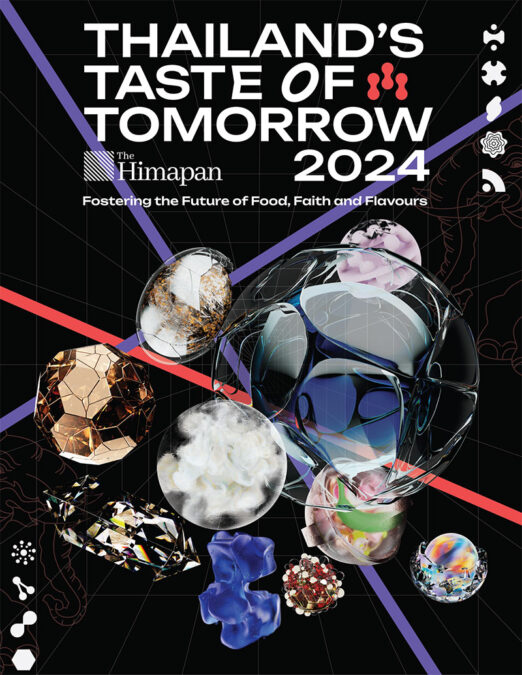
This event is organized by the Ministry of Higher Education, Science, Research, and Innovation (MHESI) through the Program Management Unit for Competitiveness (PMUC) in collaboration with partner agencies. Together, they are creating a phenomenon that breaks the boundaries of marketing for Thai food innovation products through a ‘Marketing Platform for Future Food Innovation Businesses,’ incorporating cutting-edge activities to stimulate the consumer’s five senses. It combines storytelling through Thai culture, inspired by the legend of Himmapan Forest, with support from leading private entities from the food industry, hoping to catch the eyes of investors attending the pitching of the 10 Thai startups.

Looking at the list of partners joining this activity, it’s clear that they are exceptional, including the FOREFOOD Business Acceleration Platform for Food Tech Startups & Spinoffs, the Food Innopolis by the National Science and Technology Development Agency (NSTDA), the International Gastronomy Tourism Centre (iGTC) of the Faculty of Tourism Development at Maejo University, the Kasetsart University Sensory and Consumer Research Unit (KUSCR) from the Faculty of Agro-Industry, Kasetsart University, and the Creative Economy Agency (Public Organization).”
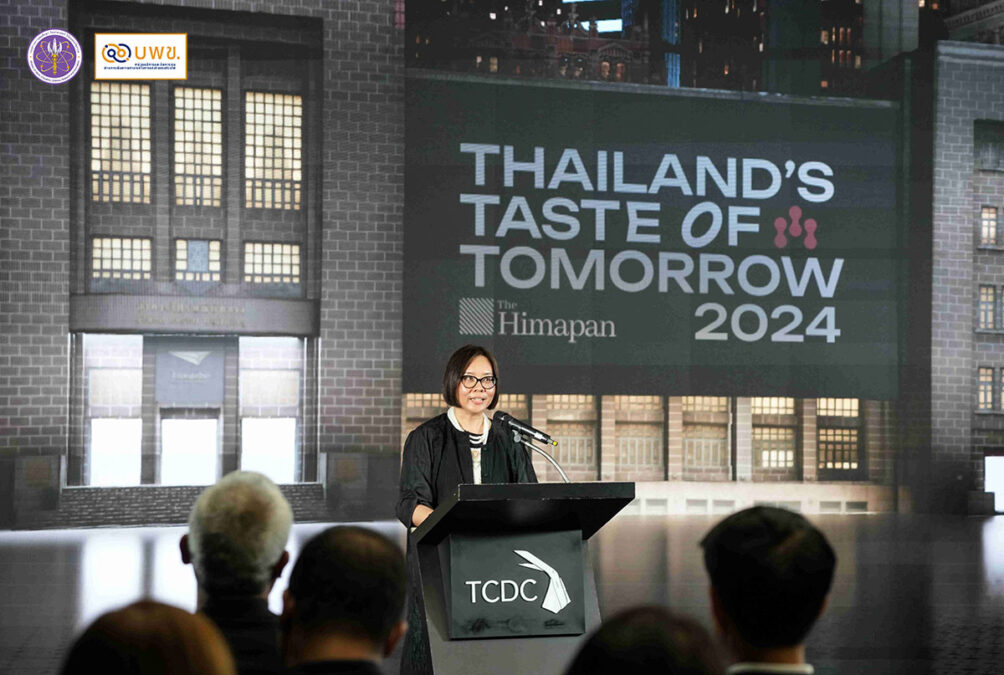
Associate Professor Chalida Brompichaichartkul, Ph.D., Deputy Director of Research Strategy at the PMUC, stated that this new dimension of presenting future food innovations is part of the project titled “Food Innovation Global Market Launchpad Testbed: Thailand’s Taste of Tomorrow)”. This initiative aims to accelerate the commercialization of deep science and technology innovation to support and promote the sustainable growth of Thai food technology startups in the international market by presenting innovative food products and future food ingredients. The project creates a marketing experience by telling the story of each innovative product through creative media, such as showcasing 10 types of food technology innovations in a multi-sensory art gallery, which stimulates not only sight but also senses like taste and smell through scent and flavor technology by the research team from KUSCR.
The exhibition also features an imaginative display of food technology with health benefits through the concept of “Thai Tastetology,” combining Thai technology (Thai Tech) and Thai sensory experiences (Thai Touch), bringing the essence of the mythical Himmapan forest from Thai literature into the “Himmapan Remix 2050” exhibition, presented by Greyhound Café Co., Ltd. Additionally, there will be a fusion of food and sound designed by young Thai chefs and an exhibition that blends food with multimedia, light, and sound in digital art, created by the Creative Economy Agency (Public Organization). Visitors will also experience a journey into the land of unique flavors through the presentation of “The Art of Siamese Taste” inside the state-of-the-art Olfactory Gallery, designed by SILPIN Thailand.
This event will be an important platform for building and developing networks and connecting Thai food technology startups to the global stage. It aims to attract investors and target groups, giving them the opportunity to experience innovative future food ingredients with 10 food technology startups that aspire to bring Thai food to the world stage. These include:

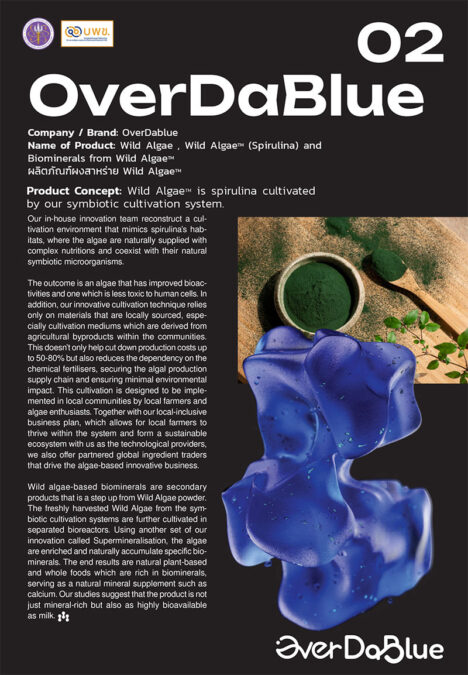
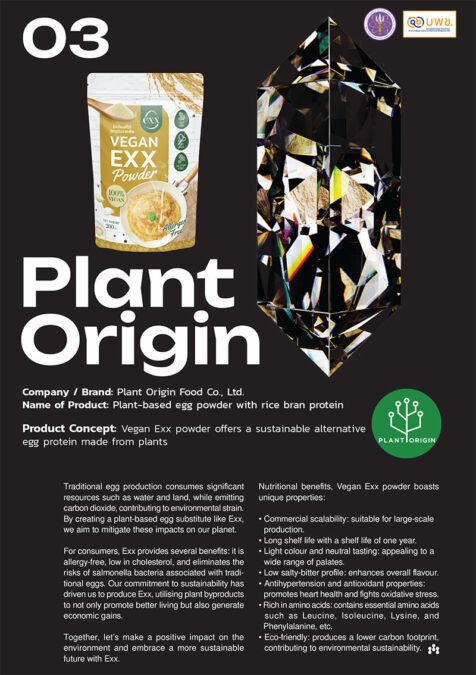
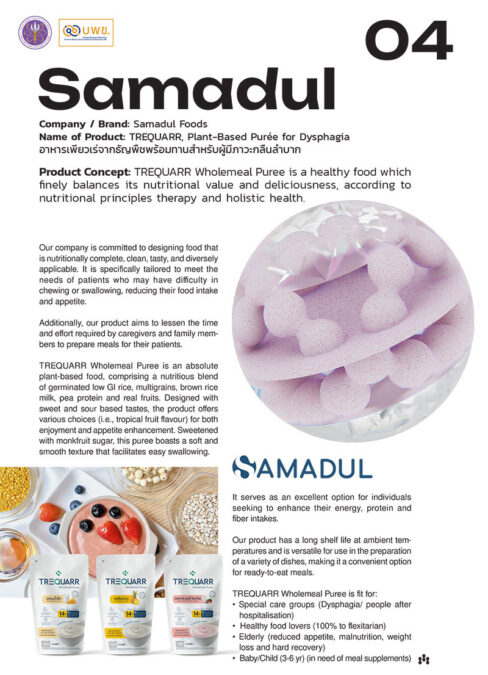
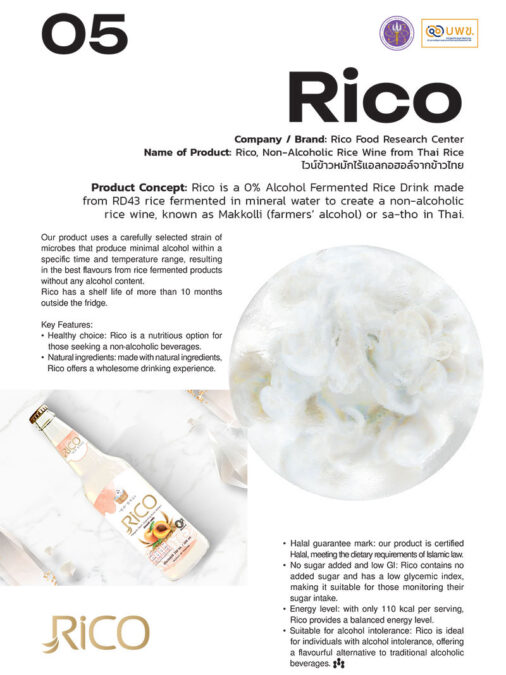
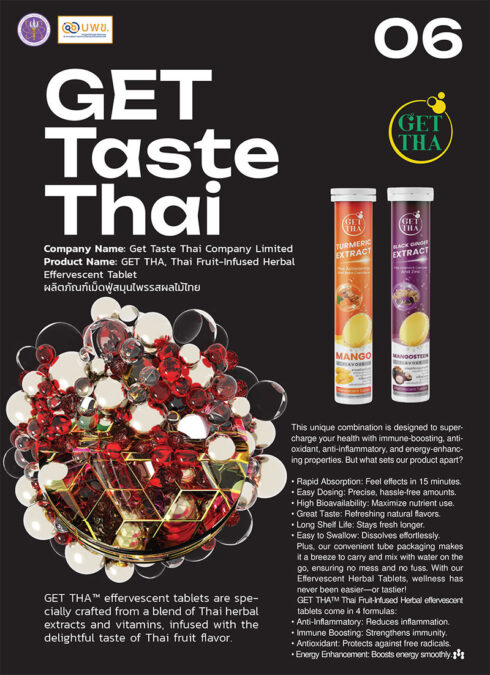


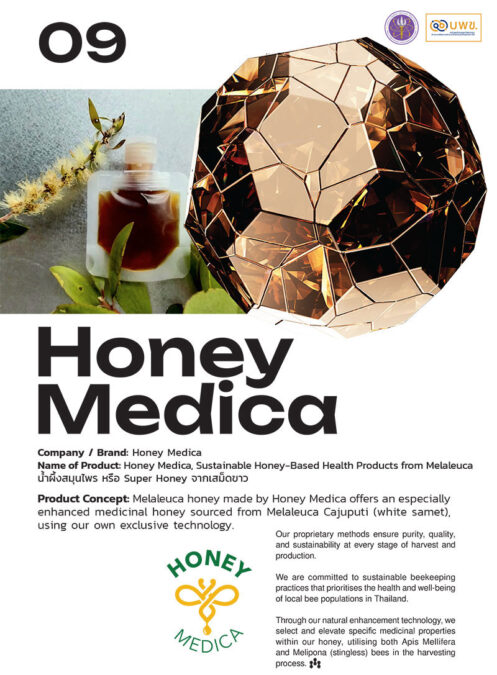
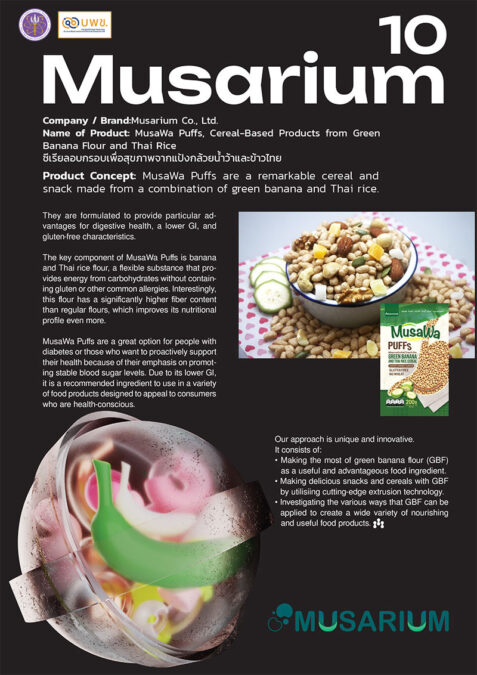
ChixTein (All Natural Chicken Protein Concentrate)

This product was developed from research over 5-6 years. The inventor saw Thailand’s strength as a protein source, capable of producing high-quality protein. The first product developed was cricket protein powder, produced with iSec technology, under the brand name “Sixtein,” which was highly successful. This led to the production of the 100% natural chicken protein concentrate called ChixTein, containing 80-83% protein. Eating 100 grams of ChixTein provides 80-83 grams of protein, which is an essential nutrient for people of all ages. However, the problem for humans is that they often do not consume enough protein. For example, to get 83 grams of protein, one may need to eat half a kilogram of chicken breast. ChixTein addresses this need, offering value to consumers concerned with health and sustainability.
“100% natural chicken protein concentrate: an essential nutrient for people of all ages.”
OverDaBlue (Wild AlgaeTM (Spirulina) and Biominerals from Wild AlgaeTM)

OverDaBlue specializes in developing alternative algae cultivation processes. The flagship product to be showcased in London is WILD Spirulina, or wild algae, a vegan product. It is considered a food of the future, as it contains essential nutrients needed by the body, such as calcium, which is particularly beneficial for those who require additional calcium, especially the elderly. The company’s advanced technology enhances the calcium content, making it 100 times more valuable compared to conventional products. This makes it a new type of supplement, restoring happiness and vitality for people of all ages.
“WILD Spirulina, a new type of supplement, easy for the elderly to consume, good for everyone to use.”
Plant Origin: Plant-based egg powder with protein from rice bran

This work by researchers from Chiang Mai University studied the extraction of protein from rice bran, which is waste material from the rice processing procedure. Laboratory analysis found that it contains a very high amount of protein, more than 10-15 percent. It can be used to extract protein to sustainably utilize agricultural waste and turn it into a high-value product. However, in the initial stages, there were limitations, such as the protein having a bitter and salty taste. Eventually, deep technology was developed to solve the issues of bitterness and saltiness, resulting in a protein with unique characteristics, higher yield, increased protein content, and improved solubility. This led to the development of a product called plant-based egg powder with protein from rice bran, which is truly natural. It is believed to certainly attract the interest of business people and importers attending the London Week presentation.
“Egg flavor to please the VEGAN at heart.”
Samadul: Plant-based purée for dysphagia.

Inspired by the inventor’s personal experience, who faced a situation with a family member battling terminal stage cancer, leading to a search for herbal alternatives from across the country. This experience revealed that Thailand has many hidden treasures still waiting to be utilized. The patient suffered from not being able to access food they could eat, causing their condition to worsen, weight loss, and eventually leading to a tragic end. This led the inventor to a resolution to use the new-found knowledge to solve these problems through holistic health care, both in terms of food and mental well-being. Eating favorite foods can significantly recondition the patient’s mental state. Hence, research and development were undertaken, resulting in a plant-based purée from grains, ready to eat for those with dysphagia. It is suitable for people with difficulty swallowing and those needing high energy but in ability to consume larger amounts of food. It contains plant-based proteins high in fiber and essential nutrients, with a texture tailored for people with difficulty swallowing. Fresh, sweet-tart fruits are added to increase palatability and stimulate consumption, and it can be adapted into other menu options as desired.
“Samadul: High-fiber plant-based protein, easy to swallow, good for the body and heart of patients.”
RICO (Non-Alcoholic Rice Wine from Thai Rice).

From the intention to improve the quality of life for farmers, it started with the large-scale rice fields of “Pak Kai Rice” (“Chicken Beak Rice”) in Ratchaburi Province to support the farmers around the factory. The rice strain RD43 was developed and used to create new products. It was found that the rice wine trend is growing significantly in the global market. In Thailand, there is a similar product called Sato, but it is hard to find, leading to missed opportunities in developing Thai rice into rice wine. Therefore, RD43 rice, which has a low glycemic index and is suitable for diabetics, was developed into fermented rice water under the rice wine concept, but without alcohol. This resulted in the product Rico, the first fermented rice water in mineral water in the country and the world.
“Thai Alcoholic Rice Wine is second to none in the world.”
Get Taste Thai: Thai Fruit-Infused Herbal Effervescent Tablet.

Another product resulting from research, aimed at addressing the needs of patients with difficulty swallowing, is the Thai fruit-infused herbal effervescent tablet, which is particularly interesting. In addition to using a production process focused on sustainability and environmental friendliness, the fruits used in the effervescent tablets must be GI (Geographical Indication) products, meaning they are unique to specific regions of the world. For example, turmeric must come from Surat Thani, mangoes from Bang Khla’s Nam Dok Mai Si Thong variety, mangosteen from Khao Khiri Wong, and Phulae pineapple, to name a few. This selection truly emphasizes uniqueness and identity. The use of deep technology to extract the aroma, flavor, nutrients, and vitamins is also noteworthy. Although the effervescent tablet market currently has many producers, there is no Thai herbal effervescent tablet, and the use of GI fruits as raw materials is unique to this product. Entering the global market should therefore not be difficult.
“Thai fruit-infused herbal effervescent tablet: A new product worth trying.”
ImuneUP – A Functional Ingredient Product to Enhance the Immune System (Cell-Based Immune Boosting Ingredients).

One of the entrepreneurs aiming to bring research off the shelf and into the market has developed ImuneUP, a functional ingredient product that enhances the immune system. It has received the Top Innovation Award at the THAIFEX event due to its advanced technology. Developed in collaboration with Maejo University, this product has significantly reduced the cultivation time of Cordyceps militaris mushrooms, used for extracting immune-boosting substances, from the usual 90 days to just 7 days. With confidence in the marketing approach, the team believes they are on the right path.
“Immune-boosting function that won the Top Innovation Award at THAIFEX.”
Calcineers – A Bio Calcium Supplement Product from Tuna Bones.

From the experience of a researcher who was diagnosed with stage 2 cancer and could not complete chemotherapy due to the body’s inability to tolerate it, and had to retreat home and treat themselves with herbal medicine. Six months later, a check-up revealed no signs of cancer. This inspired the development of a good supplement for consumers. With a family background in the fishing industry, where large amounts of fish scraps are discarded or used as animal feed, the idea to produce calcium from tuna bones emerged. In addition to being bio-calcium, it also contains herbs beneficial to the body, is 100% organic, is easily absorbed, and leaves no residues in the body. This product is expected to appeal to investors and importers looking for such a product to market.
“Bio-calcium mixed with herbs, beneficial to the body, 100% organic.”
Honey Medica – (Sustainable Honey-Based Health Products from Melaleuca)

The Honey Medica brand entered Thailand 10 years ago, collaborating with educational institutions and universities in Thailand, particularly in Chiang Mai and Nakhon Ratchasima. They also worked with key persons in Thailand, especially in researching and establishing standards for honey products. It all began with trips to collect quality honey samples from various regions of Thailand. Today, they can produce high-quality honey products sourced from southern Thailand, available in Honey Shot and Honey Yummy forms. The brand aims to produce sustainable honey products while educating Thai consumers about the proper consumption of honey for health benefits, alleviating illnesses and various conditions. In the future, they plan to create projects that provide the best environment for bees and expand beekeeping efforts with diverse plants in Thailand to produce honey with unique aromas and flavors.
“Honey Medica, honey of high quality from various regions of Thailand.”
Musarium (Cereal-Based Products from Green Banana Flour and Thai Rice)

It is another research project from a professor in the Food Science and Nutrition department at Prince of Songkla University. The goal is to transform research into real products for consumers and the global market. Green bananas have been proven by global research to have significant benefits, but no one has yet turned them into powder form. This not only helps farmers by turning a widely available produce into high-value foods, but it is also in demand by consumers. Just banana flour alone, when eaten plain, has tremendous benefits. If made to be tasty, high-quality, and with long shelf life, that’s exactly what consumers want. The same applies to rice, as Thailand produces a large quantity of rice. The question is how to add more value to it. Research shows that consumers are looking for slow-releasing sugars, which are suitable for those who want to control their weight or blood sugar levels. It contains natural dietary fiber, and it does not cause weight gain. It also produces many healthful compounds. It is almost certain that this product will greatly enhance the lives of farmers.
“Eat flour without fear of gaining weight with banana and rice flour, tasty and easy to consume while providing nutrients.”

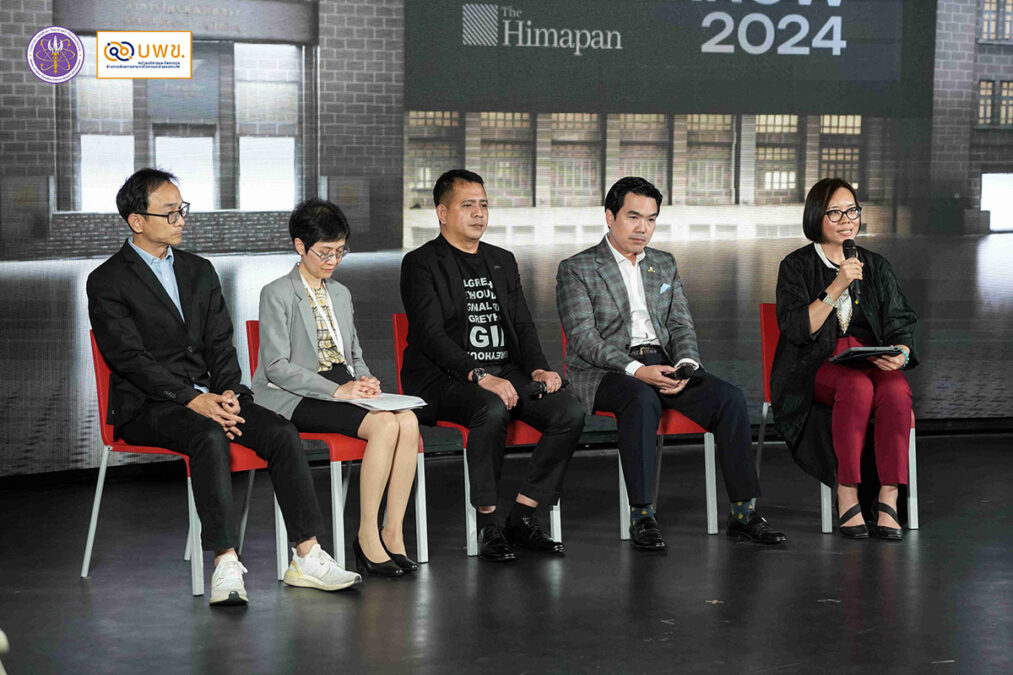
Taking 10 startups to present their work at London Tech Week 2024, sponsored by PMUC and co-organized by other agencies, also sponsored by the Ministry of Foreign Affairs, the Royal Thai Embassy in London, and private sector entities such as the Chanthaburi Chamber of Commerce, Greyhound Café Co., Ltd., and Silpin Asia Co., Ltd. Everyone involved has valuable experience and advice to offer. For example, Greyhound Café, which operates Thai restaurants in many countries, has learned what kind of food locals enjoy and how to manage Thai food to grow sustainably. Silpin Asia, which specializes in creating ingredients to enhance the flavors of Thai cuisine, will offer insights into improving the flavor profiles of the startups’ Thai food products, making them even more outstanding. Meanwhile, the Creative Economy Agency will foster creativity based on knowledge, intellectual property, and research linked to culture, historical foundations, technology, and innovation, to develop new forms of business, products, and services that add economic or social value. Additionally, Thai embassies around the world will be another channel to promote Thai cuisine to shine brightly and advance elegantly on the global stage.



